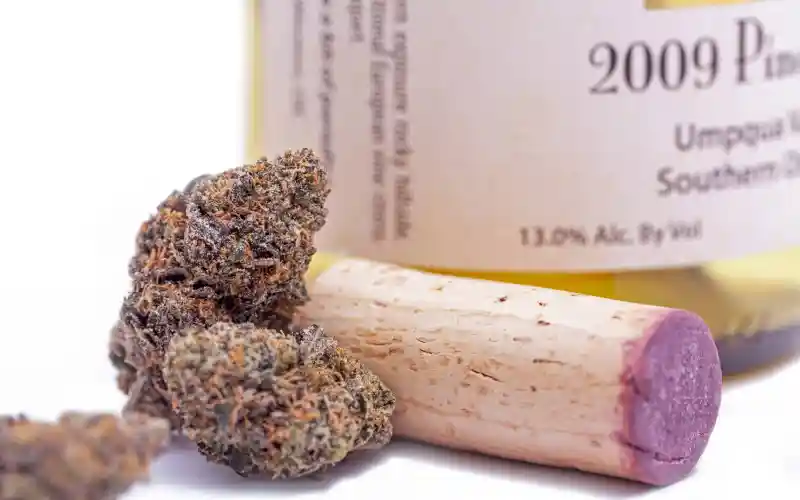Connect with us
Published
9 months agoon

Cannabis businesses in Texas may soon make more money than the wine industry, the Austin Business Journal reports. Cannabis companies brought in over $8 billion in revenue in 2022, according to a new report from Whitney Economics, an Oregon-based cannabis and hemp analytics firm. Even though plenty of people enjoy both wine and weed (sometimes together), the booze hounds and the stoners are always competing against one another, even just for fun. And, at the moment, in Texas, the sommeliers may need to watch their backs.
However, unfortunately, there is one major setback keeping the stoners from celebrating this win. Recreational cannabis is still illegal in Texas. Possession of up to two ounces is a class B misdemeanor and can get you up to 180 days in prison and a fine of up to $2,000. In November of 2022, the vast majority of voters in Denton, Texas, approved a measure decriminalizing low-level marijuana offenses. However, city leaders defied those results, voting “against adopting the ordinance that would have decriminalized marijuana” by a margin of 4-3, CBS News Texas reported.
The Tex-Mex restaurant E-Bar recently went viral for its anti-stoner policy posted on its window reading: “If You Have The Smell Of Marijuana On You We Will Not Serve You.”
The Lone Star State allows medical cannabis for conditions such as epilepsy, multiple sclerosis, and terminal cancer. Texas’ Compassionate Use Program confirmed they had nearly 61,000 registered patients in July (up from more than 45,000 in January, according to state data).
However, that doesn’t mean that Texans who use marijuana medically can just get a high-THC edible delivered to really knock out the pain while they kick back to binge-watch a dark comedy. Residents in states like New York and California forget how good they have it. In Texas, medical patients are only granted low-THC oil, with less than 1% THC. This law has been in effect since 2015. CBD is legal, thanks to the passage of the 2018 Farm Bill, and that’s what these analytics looked at.
“This landmark study affirms the true value the hemp industry provides our state, from creating jobs and supporting livable wages to fostering business expansion and product innovation,” stated Ilissa Nolan in a statement, executive director of the Texas Hemp Coalition, a nonprofit dedicated to hemp advocacy and education, the Austin Business Journal reports.
Whitney Economics compiled the data using surveys sent to CBD and hemp retailers, manufacturers, distributors, and smoke and vape shops, gas stations—pretty much any type of business that sells CBD was included. But only some of them got to participate. Around 53% of the estimated 5,000 hemp, CBD, and cannabinoid retailers, manufacturers, and distributors in Texas received the survey. So, these findings, while exciting, are limited.
According to the data, businesses involved in hemp-derived CBD, from the manufacturing to the storefront, employed more than 50,000 Texans, generating between $19.1 billion to $22.4 billion in economic growth. (Revenue, which is income, is different from economic growth, which is an increase in the production of goods and services in an economy, hence the disparity between the earlier cited $8 billion figure). Worker wages in the cannabis space went beyond $1.6 billion.
Conversely, the wine industry generated more than $20 billion for the Texas economy, according to Wine America, supporting more than 141,000 jobs with nearly $7 billion earned in worker wages.
Alcohol sale was restricted in Texas leading up to national prohibition, which lasted from January 17, 1920 to December 5, 1933, but business has been booming since then. CBD has only been able to establish itself as a legal business model in the Lone Star state since 2018. Considering cannabis is already catching up to wine, despite the fact that it’s only legal in its mildest form (CBD), this indicates that Texans are voting with their money, and that money says that they want more cannabis.


Study Reveals State Cannabis Legalization Lowers Immigrant Deportation


DEA Challenges Bid To Use Psilocybin Under ‘Right To Try’ Legislation


Vegans Rejoice as Farmers Switch from Chickens to Hemp


Louisiana Legislative Committee Unanimously Passes Adult-Use Cannabis Framework Bill


Louisiana House Bill to Regulate Hemp Products Advances Along With Senate Bill to Ban


Cresco Labs Workers Reportedly De-Unionize
